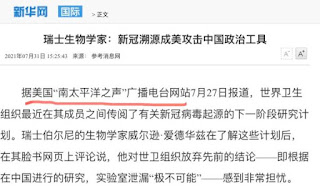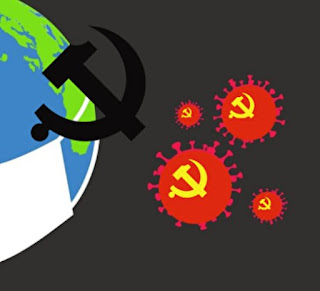Research, editing : Gan Yung Chyan, KUCINTA SETIA
In remarks made to the committee following the vote, Dr. Helen Keipp Talbot, an associate professor of medicine at Vanderbilt University and committee member, noted that the CDC didn’t refer to the third shot for immunocompromised people as a “booster shot.”
Moderna and the Pfizer-BioNTech alliance could reap billions from covi vaccine booster shots in the coming years, in what analysts and investors say could be a market comparable to the $6 billion in annual sales for flu vaccines.
Pfizer, its German partner BioNTech, and Moderna have together locked in over $60 billion in sales of their respective COVID-19 vaccines through 2022, with the agreements covering initial doses and booster shots, according to Reuters.
Analysts cited by the outlet predict revenues of over $6.6 billion for the Pfizer-BioNTech alliance and $7.6 billion for Moderna, chiefly from booster shots. Over a longer-term horizon, they predict the market will eventually settle at around $5 billion or more in annual revenues as rival drugmakers enter the space.
Moderna did not immediately respond to a request for comment on booster shot sales projections, while a Pfizer spokesperson said the only forecasts the company is providing are 2021 projections for $33.5 billion in covi vaccine revenues.
Moderna President Stephen Hoge said in an interview last week that it is unclear what the market forces driving covi vaccine sales will be going forward, adding that, “at some point, this will become a more traditional market—we’ll look at what are the populations at risk, what value are we creating, and what are the number of products that serve that value. That will ultimately impact price.”
Pfizer executives said during the company’s second-quarter earnings call that they believe a third dose will be necessary 6 to 8 months after vaccination, and at regular intervals thereafter.
The vaccine makers have said evidence of waning antibody levels in fully vaccinated people after six months, along with an increasing rate of breakthrough infections in regions affected by the Delta variant, support the need for boosters.
It comes as U.S. regulators on Thursday authorized Pfizer-BioNTech’s and Moderna’s covi vaccine booster shots for certain vulnerable and immunocompromised people. The Food and Drug Administration’s (FDA) approval came in the form of an update to the existing emergency use authorizations for the two mRNA vaccines. Several other countries, including Israel and France, have similar recommendations on booster shots.
The FDA’s move was followed by a Friday decision by a key medical advisory panel to the Centers for Disease Control and Prevention (CDC), which unanimously voted to recommend the boosters to immunocompromised Americans. The approval of the Advisory Committee on Immunization Practices clears the way for a final nod by CDC, expected later Friday, which would allow for near-immediate rollout of the boosters.
White House COVID-19 advisor Anthony Fauci said in an interview Thursday that he believes it is “likely” and “inevitable” that everybody will need a covi vaccine booster shot.
“It’s likely that that will happen at some time in the future,” Fauci told CBS News when questioned on the topic.
In a separate interview with NBC News on Thursday, Fauci said that “inevitably, there will be a time when we’ll have to give boosts to the general population.”
It comes amid a surge of the Delta variant of the Chinese Communist Party (CCP) virus, the pathogen that causes COVID-19, which currently accounts for at least 80 percent of newly sequenced cases in the United States.
Biden administration officials first signaled last month that certain groups would need CCP virus booster shots.
News (25) to (28) / Reporter : Zhang Ting / Editor : Li Yuan / https://www.epochtimes.com/gb/21/8/13/n13161068.htm
News (25)
Can the U.S. and PRC cooperate while competing? Experts analyse
While the United States and People's Republic of China (PRC, the CCP) have conflicts on Hong Kong, Taiwan, and human rights issues, they have also signalled to the outside world that they do not rule out the climate Cooperation on such issues. Whether the two countries can truly cooperate has aroused the attention of all parties. Professor Pei Minxin, an American political scientist and China expert, believes that the United States and China currently have no trust and any cooperation will be difficult.
Since taking office in January, Biden has basically maintained his predecessor Trump’s China policy on many major issues, continued to impose tariffs on hundreds of billions of dollars in Chinese imports, and imposed new measures on Chinese companies. Sanctions condemned Beijing’s repression of Hong Kong democrats and the persecution of human rights in Xinjiang.
Pei Minxin, a professor at Clemmont McKenna College (CMC) in the United States, published an article in the Nikkei Asian Review on August 12, stating that there is a major difference between Biden and Trump. Trump believes that addressing climate change is a “scam” by the CCP, and there is no room for cooperation on this issue; while Biden seeks to reach consensus with Xi Jinping on climate change and other global issues.
The CCP has repeatedly emphasized that the United States and China can cooperate. Chinese Foreign Minister Wang Yi said in March this year that the competition between China and the United States is not surprising, but the more important aspect of the relationship between the two countries should be cooperation. He listed the CCP virus (coronavirus) pandemic, economic recovery and climate change as areas where the two countries can cooperate.
Nonetheless, neither side has shown that the two countries can find a delicate balance between competition and cooperation. Since Biden took power, the two countries have continued to clash over issues such as human rights, technology, Taiwan, the South China Sea, and Hong Kong.
News (26)
Pei Minxin: From two perspectives, US-PRC cooperation will be difficult
Pei Minxin said that although it may be too early to completely deny cooperation between the United States and China on important issues such as climate, the experience of the past six months has shown that the United States and China are unlikely to succeed in finding a way to stabilize their relations.
Pei Minxin also said that it is certain that any form of cooperation between these two geopolitical opponents will be difficult. Cooperation between the United States and China in any matter requires a minimum of trust. Sadly, this trust does not yet exist. Beijing believes that the United States is preventing its rise, while Washington believes that Beijing is trying to replace the United States' global leadership and seek world domination. When each party looks at the other party with a "zero-sum perspective," there is no trust between the two parties.
However, Pei Minxin believes that if the areas of competition are less than the areas of possible cooperation, then cooperation between the two rivals is still possible. In other words, the overall measurement of competition and cooperation tends to cooperate. But this is not the case in US-China relations today.
U.S.-China competition covers almost all areas of national interest, such as technological superiority, security, trade, and global influence. The competition issues between them are too numerous to list, but neither Washington nor Beijing can come up with more than three or four issues that they think can have room for cooperation. Given this imbalance, it is no wonder that cooperation is classified as a secondary issue.
In addition, in the United States, when it comes to safeguarding Taiwan’s security, sanctions against CCP officials accused of violating human rights in Hong Kong and Xinjiang, and restricting the transfer of technology to the CCP, there are strong supporters, demanding that the government quickly resolve these issues. Decide. At the same time, the leaders of the Chinese Communist Party regard Taiwan, Hong Kong and Xinjiang as non-negotiable sovereignty issues. This confrontation will make cooperation between the two countries in other areas almost impossible.
Pei Minxin said that it may be difficult to strike a viable balance between competition and cooperation, but it seems that there is no choice but to "cooperate and compete." It is obviously impossible to restore contact between the United States and China, but a new and comprehensive cold war will be catastrophic. The challenge for Biden and Xi Jinping is how to save the cooperation and competition between the two countries after an ominous start.
News (27)
Australian expert: cooperation with the CCP is not feasible
Salvatore Babones, a well-known Australian sociologist and Associate Professor at the University of Sydney, also said in an interview with Epoch Times after Biden took office in January that although Biden’s current China policy is still unknown, he will find out that he will have a relationship with the Chinese Communist Party. Cooperation is not feasible.
"Biden will soon discover that cooperation with the Chinese Communist regime is impossible." Barbos said, "The Chinese Communist regime went through a period of liberalization from the 1980s to around 2010. We (now) see It is not a good regime, not a liberalized regime", "under the leadership of Xi Jinping, what we are seeing is more and more repression."
Barbos also stated that the United States' contacts with China (the CCP) in the past few decades have obviously not led to a change in China (the CCP). "Each contact simply means that more military hardware or more technology is used to help China (the CCP) implement oppression of its own people and aggression against neighboring countries."
News (28)


















No comments:
Post a Comment